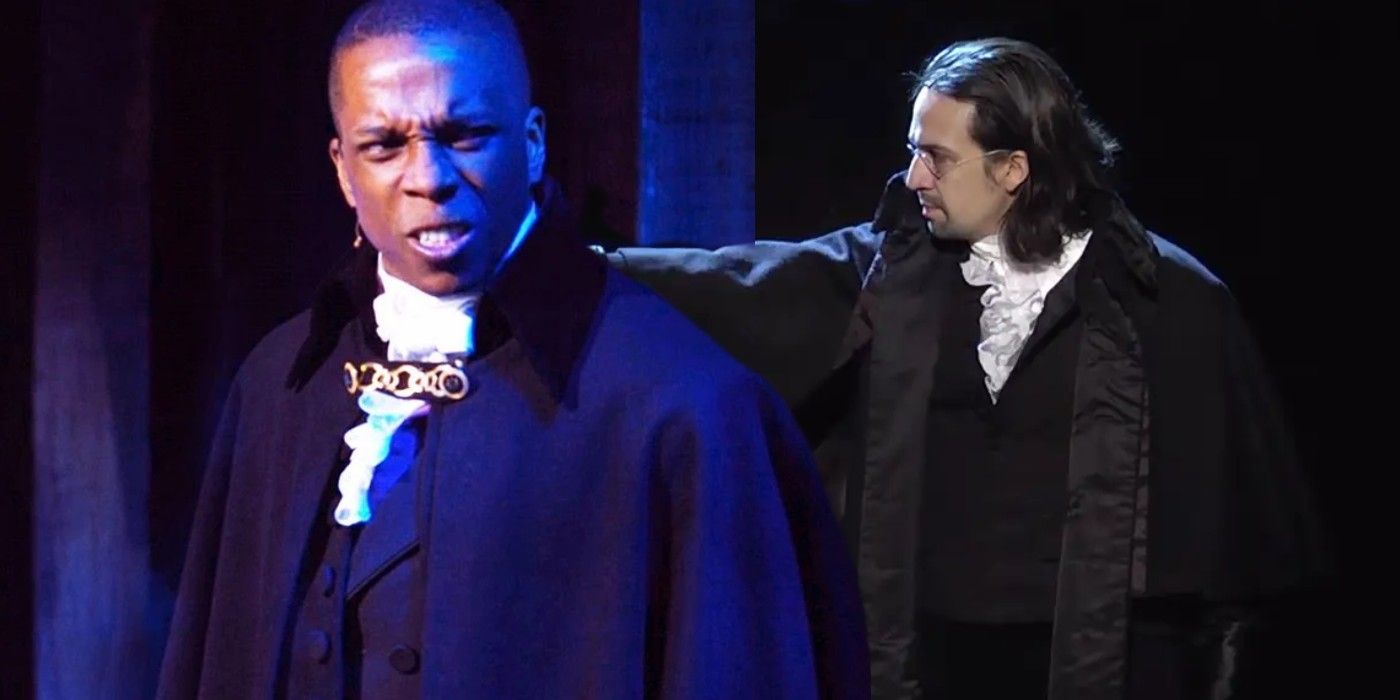Alexander Hamilton’s duel against Aaron Burr is one of Hamilton‘s most impactful scenes, but earlier versions of it looked quite different. Lin Manuel Miranda’s 2015 musical tells the story of Alexander Hamilton, the ten-dollar Founding Father, using actors of color in historical roles and a unique hip hop score. It was an instant hit on Broadway, breaking the record for the most Tony Awards nominations received by a single show in 2016. Hamilton’s R&B influences broadened the show’s appeal beyond theater circles and into the mainstream, where even audiences who would not typically pay any mind to a musical bought into the Hamilton craze.
Click the button below to start this article in quick view.
Beyond its catchy songs, Hamilton’s powerful storytelling adds to its charm. The musical presents what may be otherwise seen as a dry history lesson as an engaging tale of love, loss, and political ambition in the early years of the United States of America. The years-long political rivalry between Alexander Hamilton (Lin-Manuel Miranda) and Aaron Burr (Leslie Odom Jr.) makes up much of the show’s emotional core. Their animosity comes to a head after the 1800 presidential election, where Hamilton endorses Thomas Jefferson instead of Burr for office. Burr challenges Hamilton to a duel in the song “The World Was Wide Enough,” in which Hamilton, aiming his pistol to the sky, is fatally shot by Burr.
The duel scene’s intensity and the song’s clever use of refrain work in tandem to create one of the musical’s most powerful scenes, but earlier versions of it provide a contrasting portrayal of Hamilton’s final moments. The Burr/Hamilton duel was originally accompanied by one of Hamilton‘s cut songs called “Ten Things, One Thing,” which evolved into the version seen in the final musical. While it has similarities to “The World Was Wide Enough,” a few key changes make the earlier draft of the scene feel drastically different.
“Ten Things, One Thing” and “The World Was Wide Enough” begin with the same counting-up motif from the show’s chorus previously seen in “Ten Duel Commandments,” followed by a verse of Aaron Burr’s experiences leading up to the duel, which is left largely intact in the final version of the number. When Burr fires his pistol, though, the two songs diverge. The chorus sings the counting refrain backward as the song “rewinds,” similarly to what happens in “Satisfied.” In a flashback, Hamilton raps his perspective of his preparation for the duel, with lyrics parallel Burr’s verse. Hamilton’s verse reveals his tragically misplaced confidence that he will survive the duel, singing “It’s not in [Burr’s] political interest to kill me.” The song ends at the exact moment Burr shoots Hamilton, cut off by his cry of “Wait!”
The earlier version of the song trades the final cut’s bullet freeze frame for the rewind. In “The World Was Wide Enough,” the entire scene, including the music, pauses for Alexander to reflect on his life and his legacy. This Hamilton is anxious about what he will leave behind, reflected in the manic pace of his rapping. Appearances of dead characters create the feeling that his life is flashing before his eyes, giving the song an appropriately dizzying mood that “Ten Things, One Thing” and its more measured, cocky verse for Hamilton lacks.
While “Ten Things, One Thing” provides an interesting insight into Alexander Hamilton’s thoughts before the duel and continues the motif of his and Burr’s mirrored lives, the final version of the monologue’s emotional impact is unmatched. Seeing Alexander’s seemingly unbreakable confidence falter in his last moments at the end of Hamilton is touchingly human, which is part of what makes Hamilton so beloved in the first place.
About The Author
